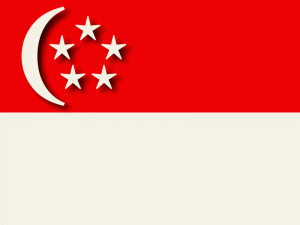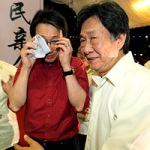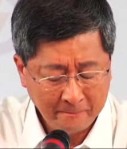What a scoop!
March 16, 2012
 We all try a little too hard sometimes. The Straits Times today (16 March 2012) ran a feature piece entitled “The ‘engage and consult’ route in policy review”. The piece sought to discuss how the PAP government is now engaging and consulting more regularly and intently than before, a sign, no doubt, of its newly acquired sensitivity. Nothing strange in that except for, well, it’s a Straits Times’ story.
We all try a little too hard sometimes. The Straits Times today (16 March 2012) ran a feature piece entitled “The ‘engage and consult’ route in policy review”. The piece sought to discuss how the PAP government is now engaging and consulting more regularly and intently than before, a sign, no doubt, of its newly acquired sensitivity. Nothing strange in that except for, well, it’s a Straits Times’ story.
The piece quoted or mentioned 13 people for their opinions of this new ‘engage and consult’ route. Again, nothing new, except for the fact that 9 of the 13 people were PAP leaders and MPs. The only party-neutral people were Gerald Ee, Viswa Sadasivan, Ruben Wong, and Eugene Tan. Imagine wanting to review the culinary products of a restaurant and interviewing only the chefs of that particular restaurant for their opinion and you will understand the investigative prowess of that national treasure we call the Straits Times.
“So Mr PAP MP, can you tell me how genuine your government’s ‘engage and consult’ approach is?”
“Yes, it’s very genuine. Very genuine indeed!”
“Thank you…what a scoop!”
Now of course I’m sure the Straits Times did attempt to interview people who were crucial to the story – those who were actually ‘engaged and consulted’ by the government – like say, heritage groups, disabled people, public transportation commuters or the poor. After all, their experiences and views would be salient to whether this ‘engage and consult’ approach was genuine right? How many of them were quoted? Zero.
Pritam Singh and Ombudsman
March 7, 2012
I note that there has been some discussion about Workers’ Party MP Pritam Singh and my post “Time for an Ombudsman in Singapore” (23 Sept 2008).
For the record Pritam contacted me for permission to use some of my text. I told him to go ahead with my blessings. No acknowledgements were necessary. I am happy he found my thoughts useful. Let’s keep our eye on the bigger picture.
Our Emperor Fetish
July 13, 2011
 One of the key differences between a monarchy and an elected government is the source of legitimacy. In monarchies, the King or the Emperor enjoys moral and political legitimacy because he is ordained by Heaven. And because the Emperor is ordained by Heaven, he enjoys the power and the perks that come with empire or imperialism.
One of the key differences between a monarchy and an elected government is the source of legitimacy. In monarchies, the King or the Emperor enjoys moral and political legitimacy because he is ordained by Heaven. And because the Emperor is ordained by Heaven, he enjoys the power and the perks that come with empire or imperialism.
In elected governments, individuals enjoy moral and political legitimacy by being elected into office. It is only when individuals enjoy this legitimacy are they allowed to enjoy the perks and benefits of that office, whether ministerial or presidential.
If you read the article in CNA reporting that Members of Parliament Lee Kuan Yew and Goh Chok Tong still enjoyed staff support from the government, you’ll be forgiven for wondering which political system we’re operating here.
http://www.channelnewsasia.com/stories/singaporelocalnews/view/1140460/1/.html#.Th0ukcJsJvw.facebook
Having resigned from Cabinet, these two should have left behind the perks and benefits that come with their respective offices. Getting an array of secretaries, press secretaries, and clerical assistants makes a mockery of their resignation.
The rationale for these perks and benefits is perfectly in line with that of monarchical legitimacy. These men are special, people look up to them and foreigners want to meet them not for the office they represent, but for who they are. And it is because of who they are, not the office they hold, that they are getting taxpayers’ support. Lee and Goh undermine the concepts of resignation and retirement where power is given up, and underline the meaning of monarchies where power resides in the Emperor until he dies.
Singapore, that freak of colonial invention, is a political bastard yearning for civilizational parentage and we look to the closest civilization and imagine ourselves echoing in the great kingdoms. Our romance with monarchies is not yet dead.
Such decisions only further entrench the cynicism amongst many Singaporeans over the PAP government’s ability to reform. It shows that their resignation from Cabinet was pure gesture, a symbolic move to shock and awe the hoi polloi into believing that an era had ended and a new political paradigm had begun. The more things change, the more they stay the same.
The Populist, Offensive and the Middle Paths
May 9, 2011
 As I awoke half-naked from Saturday night’s drunken stupor and removed the Workers’ Party flag from one of my orifices, I had PM Lee’s words ringing in my ears. After all “reform” and “soul searching” are as synonymous with the PAP as “neutral” is with The Straits Times.
As I awoke half-naked from Saturday night’s drunken stupor and removed the Workers’ Party flag from one of my orifices, I had PM Lee’s words ringing in my ears. After all “reform” and “soul searching” are as synonymous with the PAP as “neutral” is with The Straits Times.
But could the PM be genuine about change? The lowest national share of the vote since independence must surely force home the need for not just a reassessment of governance ethos but also a studied shift in the type of policies implemented so far. And yet, with so much invested in the economy, any tinkering with public policies, whether in housing or immigration, will impact the statistical growth that the incumbent is so weaned on.
There are three possible paths the PAP can take – the populist path, the offensive path and the middle path.
The populist path would begin with the PM delivering on his promise to soul search and reform. People believe this path will point to the PM’s apology and pledge to “listen to all views”. If the PAP takes this path, we may see several policy changes like:
- significantly reducing ministerial and Presidential pay (say 40%)
- raising HDB income ceiling from $8000 to $10000 and significant lowering HDB flat costs for first time buyers
- reducing classroom sizes from 40 to about 30-25
- lowering rentals for SMEs
- tightening immigration policy by raising the bar for Employment Pass workers
- make it mandatory for employers to show that they cannot get Singaporeans before hiring foreigners
- reducing size of Cabinet
- turning REACH into a statutory board and enhancing its platform and power
The offensive path would be the opposite. With George Yeo gone, there is no agent for change. PAP hardliners would reason that going soft now would send a signal to the electorate and Opposition that the PAP is open to bargaining. Those who believe that this will be the path the PAP takes will point to the fact that PM Lee believes he has strong endorsement with 69% in AMK GRC and that 81 out of 87 seats is “strong mandate”. Furthermore unpopular ministers like Wong Kan Sing and Mah Bow Tan both continue to believe they have “strong mandate” with 57% each. If the PAP takes this path, we can expect:
- the civil service to be uncooperative with Opposition MPs when it comes to providing data and information
- Aljunied and Hougang continue to stand at the end of the queue for upgrading
- resistance from Aljunied grassroots leaders to WP MPs
- difficulty in assessing public funds
- more gerrymandering for Hougang, Aljunied, Joo Chiat, and Potong Pasir
The most likely path will however be the middle path. Here the PAP will make several symbolic gestures of reform, perhaps even implementing a few popular policies, but still going on the offensive. We could see
- incremental but ultimately unhelpful raising of HDB income ceiling and lowered cost of flats
- a symbolic but insignificant reduction of ministerial and presidential salaries
- PAP MPs more proactive in voicing ground concerns in Parliament but voting unpopular bills and policies anyway
- more Chek Jawa-type U-turns. Here the government chooses to make high profile back downs from unimportant policies calculated to demonstrate willingness to listen
- Meanwhile, gerrymandering continues, public funds for Aljunied made difficult to access, RC grassroots leaders uncooperative and act as feedback for PAP
GE 2011: What it all comes down to
May 4, 2011
 It is now late in the game. In a few days we vote. By now you are probably sick and tired of hearing about how this General Election is a watershed one, tired of hearing how Singapore is at the crossroads, and tired of hearing how much your vote matters. But there is a reason why you keep hearing all this – because it is true. You need to clear your head of all the noise generated by both sides of the divide. Clear your head of all the cheesy analogies, name-calling, and insinuations. All these are mere background noise.
It is now late in the game. In a few days we vote. By now you are probably sick and tired of hearing about how this General Election is a watershed one, tired of hearing how Singapore is at the crossroads, and tired of hearing how much your vote matters. But there is a reason why you keep hearing all this – because it is true. You need to clear your head of all the noise generated by both sides of the divide. Clear your head of all the cheesy analogies, name-calling, and insinuations. All these are mere background noise.
This General Election boils down to a simple question – should Singapore continue to put all its eggs in one basket or do we nurture a credible and capable Opposition should the PAP one day fail?
The PAP of old has done a terrific job. Lee Kuan Yew, together with Goh Keng Swee, Rajaratnam, Lim Kim San and company, has pulled Singapore from Third World to First. We are forever grateful. But that team has come and gone, their time has come and gone. Today we have a different PAP team with different sensibilities and a specific renewal process.
There are two selection filters that all PAP candidates have to go through. First, you must be conventionally successful. Second, you must agree with the PAP. We would have a truly diverse group if the PAP selectors stopped at the first filter. We would then have real out-of-the-box thinking. However, it cannot stop at the first, and the PAP is compelled to ask the follow-up question – do you agree with us? And this is where group think emerges. The PAP believes that by selecting the best candidates from different industries it is truly diverse, when in fact, it is merely the self-selection of a particular set of academic qualifications, ideological mindset and life values which finds greater favour within an entrenched system. All the real diversity is filtered out by that follow-up question.
Meanwhile the world is getting more complex, not simpler. The problems of the financial crisis, widening wage gap, globalization, immigration, food and environmental security, just to name a few, are so complicated that diverse alternative thinking must be exercised. It is not just a matter of having the best data, best information, or the ability to move nimbly and quickly (as the PAP is so fond of reminding us), but also the ability to think against the grain and the gumption to tell your leaders – hang on, that might not be the best way forward. It is the ability to think up solutions that are not pre-determined by self-selected ideologies and values. You cannot come up with truly alternative solutions if you share the same precepts and premises. A Parliament with 82 PAP seats out of 84 will simply not have this ability or diversity. Can our future, our children’s future, be unconditionally staked on this type of Parliamentary dominance? Are we, as adult voters, not being negligent with our children’s future if we are easily satiated with catchphrases like “track record” and “estate upgrading”?
And there we have it. Beyond the ruling party’s arrogance, its smugness, the loss of a good foreign minister or the sheer brutality with which bills and policies are rammed through without debate, this General Election is about whether we have the maturity and heart to prepare this country for more uncertain times ahead. Come 8 May, if we wake up to a country without any Opposition in Parliament, we would know the type of nation we have chosen to be – one that is comforted only by the material and willing to be led without consultation. There is nothing wrong with that. People do take comfort in the familiar and tangible. But we would have missed a valuable opportunity to fortify our nation. We would have lost the opportunity to reach out to fellow Singaporeans who have stood up and offered themselves, with so much to lose, as alternative voices. And we would only have ourselves to blame if they are led to believe that we do not need or want them. Would our country be richer or poorer without them?
Crossroads can be perplexing. But they are only perplexing if we do not know which way to go. This General Election is a crossroad where the responsible and long-sighted route is clear. The question is whether or not we are courageous enough to take it.
10 Lessons from the GE so far:
April 26, 2011
Crying over something that contradicts your morals is no reason not to support it wholeheartedly.
Lesson #9
 Who needs Obamaresque speeches when you have the gift of sensitive tear ducts?
Who needs Obamaresque speeches when you have the gift of sensitive tear ducts?
When in doubt, obfuscate, complicate and delegate.
Sometimes there really is such a thing as responsibility without consequences.
Being “quoted out of context” – the best get-out-of-jail card around.
Sincerity resonates.
So does dignity.
The poverty line in Singapore has just been raised to 4-room flats and below.
When faced with criticisms, call for a clean fight.
….or fight dirty.
Bedroom Monsters
April 25, 2011
 The PAP is like your mean old grandmother who told you that the police will catch you if you don’t do as she says or that the monsters under your bed will devour you if you don’t go to sleep. Threats have always been the weapon of the lazy. Its anti-intellectual, irrational, but damn it’s effective.
The PAP is like your mean old grandmother who told you that the police will catch you if you don’t do as she says or that the monsters under your bed will devour you if you don’t go to sleep. Threats have always been the weapon of the lazy. Its anti-intellectual, irrational, but damn it’s effective.
It’s been a week since Polling Day was announced and already we’ve been treated to a smorgasbord of bedroom monsters of all sorts.
Bedroom monster #1
The Workers’ Party calls for a “First World Parliament”, Indranee Rajah paints a picture of Parliamentary gridlock.
This is really semantics at its most inane. I refuse to believe that Indranee cannot see that the WP means “First World Parliament” to be an internationally accepted standard where there are checks and balances, robust debates, and challenges to the incumbent party. If Indranee wanted to appeal to voters’ reason, she could have said: “Yes, we need a First World Parliament, but can the Opposition offer sensible and responsible debate? Have the NMPs outshone the three Opposition MPs and NCMP in Parliament?” No, instead she resorts to playground taunting – name a country, name a country, you can’t name a country, neh nanny boo boo! So much for raising the level of national debate.
Ng Eng Hen warns voters of a “freak election result” if they support the opposition.
This is an old monster. It rears its ugly head every five years. It’s so familiar we’re no longer afraid of it. It’s so familiar we’ve invited it to snuggle up to us. It’s so familiar we’ve even given it a name – bullshit.
Bedroom monster #3
Ng Eng Hen casts doubts on Chen Show Mao’s ability to represent Singaporeans after being overseas for 30 years.
Ng’s logic is as follows: You need to be in Singapore to understand Singapore > Chen has not been in Singapore for 30 years > Chen does not understand Singapore > ergo: Chen cannot represent Singaporeans. Let’s apply the same logic to new citizens. New citizens spent most of their lives in their original country > They do not understand Singapore > ergo: They need to return their pink ICs and red passports. Immigration problem solved.
Teo Chee Hean warns of “high insurance premium” in response to the WP’s calls for Singaporeans to strengthen the Opposition in case the PAP fails.
Here, I can do no better than to quote another blogger. “What Singaporeans will actually be paying a high premium for are [PAP] “understudies” who aren’t ready to be MPs and to pay S$15,000 a month for each of these 20-plus “understudies”. Do the maths. $15,000 a month per “understudy”, is equal to S$900,000 for each of them for a five-year term. Multiply that by say 24 new PAP “understudies” and you and I will be paying a premium of : S$21,600,000 !!! This must be the most expensive premium for “understudy MPs” anywhere on this planet.”
http://onesingaporean.wordpress.com/2011/04/08/teo-chee-hean-and-his-nonsense/
I’m really looking forward to more bedroom monsters from the PAP camp. The more they let loose, the more they remind me of mean old grannies. And the thing about PAP and grannies is that you’ll always be a child in their eyes.
Doing the small things well
February 18, 2011
 Anyone driving across Benjamin Sheares Bridge today cannot help but marvel at the changing skyline. Marina Bay, the Esplanade, the Singapore Flyer and Marina Bay Sands are architectural and urban distinctions that emboss themselves into your mind. These are the big things that Singapore has done right. We do the broad strokes of city-building well. We are good with the big picture stuff like boosting the arts, bringing F1, creating a financial hub, inventing NEWater, or wooing the multinationals.
Anyone driving across Benjamin Sheares Bridge today cannot help but marvel at the changing skyline. Marina Bay, the Esplanade, the Singapore Flyer and Marina Bay Sands are architectural and urban distinctions that emboss themselves into your mind. These are the big things that Singapore has done right. We do the broad strokes of city-building well. We are good with the big picture stuff like boosting the arts, bringing F1, creating a financial hub, inventing NEWater, or wooing the multinationals.
But big things alone are not enough to make this city tick. Doing the little things well count too – and we’re not so hot in that area anymore. Take for example the public gym that I frequent, one of the many run by the Singapore Sports Council. In there is a chin-up bar that has been broken for about 2 months. There is a crack in the joint, and over it a flapping piece of paper has been pasted which reads “Bar not in service. Sorry for the inconvenience”. I took a close look at the bar several times and realised that all that was needed was a simple wielding. I spoke to the instructors there and they agreed. So why the long delay? Well, they need to file in the report, get officers to assess the cost, put out the tender, wait for response, and so on…. all for a simple wielding job that most ITE students can do in 15 minutes. In the meantime, the bar hangs broken with an obscene piece of flapping paper stuck to it.
And I have noticed many other smaller things we can’t get handle anymore. We can’t handle floods, we can’t handle YOG certificates, we can’t handle MRT depot security, the list goes on. Lee Kuan Yew wrote that one of the reasons why he laid the island with greenery was that the mundane care that went into pruning, fertilizing and watering our trees, shrubs and bushes would show investors and visitors that we were a meticulous and fastidious people. This set us apart from the rest, and that was something to be genuinely proud of.
Today, one gets the sense that we can’t do the small things well anymore. Our famed efficiency and decisiveness is more evident in clamping down on political blogs, illegalising public assemblies, catching opposition members giving out pamphlets, and much less so in the lives of ordinary Singaporeans. One gets the sense that we are losing our priorities. One gets the sense that we’re seeing more “Sorry for the inconvenience” signs in our daily lives.
Is it a symptom of a decline in public and civil service standards? Or the side-effect of out-sourcing and privatisation? I really don’t know – perhaps both. But I do know that unless we begin to do the small things well again, even the big things will eventually fall apart.
A tweak for morality
January 26, 2011
 The Catholic Church must now come with a health warning. Like those gruesome pictures of cancers on cigarette packets, the Catholic Church must have a picture of a young couple with genital warts and herpes, with five babies crawling around them. It’s only fair.
The Catholic Church must now come with a health warning. Like those gruesome pictures of cancers on cigarette packets, the Catholic Church must have a picture of a young couple with genital warts and herpes, with five babies crawling around them. It’s only fair.
The Straits Times today reported that Catholic school principals have met MOE officials to discuss how the ministry’s sexuality education programme can be “tweaked”. “Among other things, they had asked for a segment on the use of condoms to be modified so that it better matches Catholic beliefs. The segment includes a video on the use of condoms.”
It’s not known exactly what they wanted “tweaked” (I hope no child’s bum was within a 100 metre radius), but given the Church’s stance on contraceptives, it’s safe to say that any mention of condoms will be suppressed. One only has to re-visit Pope Benedict’s remarks on condoms in Africa to understand the deep aversion the Church has to them. And the crux of the problem is what the Church has always done – confuse sex education with moral education. In fact, it goes further to conflate morality with a faith or set of religious teachings. Archbishop Nicholas Chia was quoted as saying:
What is at stake is not the method used or whether this method is natural or artificial. What is at stake is the moral act of contraception.
The good clergyman is wrong. There is a clear conceptual difference between method and morality. The former is taught in sex education, the latter should not. Sex education is about the biological and mechanical aspects of the sexual body. It deals with bodily changes, sex organs, sexual intercourse and sexuality. It should be taught responsibly in classrooms by mature teachers with teaching aids. A faith-based moral education, on the other hand, can be taught in churches, temples, mosques and other private places. To conflate the two and, as a result, omit valuable information that may save a teen from sexually transmitted disease or an unwanted pregnancy is plain irresponsible. Teaching abstinence is important. But it must be taught alongside contraceptives.
But there is nothing new in this. The Church has always adopted a ‘morality first, reality second’ approach when it comes to sexuality. More interesting is how the Christian right in Singapore are pushing the boundaries of secularism back. At the heart of the AWARE saga was a faith-based morality seeking to suppress alternative lifestyles. In this case it is seeking to suppress educational information that does not conform to its worldview.
Granted, the Catholic principals were speaking only for Catholic schools, and not proposing that the “tweaks” be reflected across the board. But the last I heard, these Catholic schools also received public funds. Furthermore it would be a sad indictment of the education system if a faith-based morality is allowed to influence the science of sexuality. What next, creationism in classrooms? Well I guess if you can believe that the world was created in 6 days, you can also believe you can teach Catholic girls to say no.
Singaporeans: Endangered Species
January 20, 2011
 Singaporeans are on the decline. And it’s time we roll up our sleeves and do something about it. No more dicking around. It’s time we look to the experts. And I don’t mean cheap dating agencies or waste-of-money Singapore Dating Network. I’m talking about the real experts – the zoos!
Singaporeans are on the decline. And it’s time we roll up our sleeves and do something about it. No more dicking around. It’s time we look to the experts. And I don’t mean cheap dating agencies or waste-of-money Singapore Dating Network. I’m talking about the real experts – the zoos!
The best zoos around the world have good animal breeding programmes with high return rates. Exotic and endangered animals are notoriously difficult to breed in captivity but, hey, if they can raise the number of American Condors, there may be hope yet for Singaporeans.
According to the International Union for the Conservation of Nature and Natural Resources there are several levels of animal endangerment.
Levels of Animal Endangerment
| Level | Condition | Animals | |
| A | Least Concerned | Low risk of extinction | Rats, hare, PRCs, Indian nationals |
| B | Near Threatened | Likely to be threatened | Manta Ray, Maned wolf, The Online Citizen, Muarah, Think Centre |
| C | Vulnerable | High risk of extinction | Columbian Spider Monkey, Alligator Gar, all opposition party members in Singapore |
| D | Endangered | Very high risk of extinction | Leatherback turtle, the Green Turtle, Singaporean nurses and top local PSLE and O Level students |
| E | Critically Endangered | Extremely high risk of extinction | Amur Leopard, Saiga Antelope, ordinary Singaporeans |
| F | Extinct in Wild | Alive only in captivity | Tasmanian wolf, Caspian tiger, Mas Selamat |
| G | Extinct | Last individual died | Dodo bird, local politicians with compassion |
According to the late zoologist Dr Devra G. Kleiman there are several conditions that zoos and animal sanctuaries need for successful animal breeding. I propose the Singapore government studies them closely.
Condition #1: You need a self-sustaining captive population
Zoos need enough breeding stock to provide a surplus. For big animals, this requires a lot of space and also good genetic management.
What Singapore must do: Make sure only good-looking Singaporeans copulate. Issue COFs (Certificate for Fornication) to couples approved by Dick Lee, Florence Lian and Ken Lim. Couples who breed without COFs will shoulder big tax burdens and have their off-springs ‘volunteered’ as future YOG food-tasters.
Condition #2: You require a suitable amount of protected habitat.
Zoos need to conduct field studies to determine the amount and type of habitat required by new population. A “wild” model is necessary to establish suitable conditions for release and population must be protected from whatever caused its previous decline
What Singapore must do: A suitable Singaporean habitat would be to convert the whole island into Takashimaya. Under such conditions, Singaporeans may be observed in their natural habitat as they graze and roam. To prevent future decline of animal stock, we have to create a stress-free environment. No mention of PSLE, COE, NS, HDB, MRT, ERP, PAP is allowed.
Condition #3: Have effective techniques to prepare animals for reintroduction
Zoos have to train re-introductees prior to release into predator environments. They have to teach animals how to find and interact properly with potential mates, and to find/construct shelter.
What Singapore must do: Make it compulsory for Singaporeans to laminate and wear their university degrees around their necks. This will help attract the right mates. To find shelter, learn how to say “first time buyer”.










